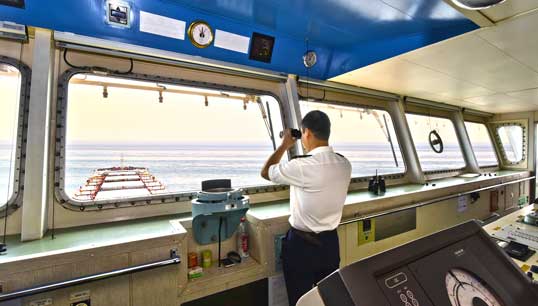- Topics
- Campaigning
- Careers
- Colleges
- Community
- Education and training
- Environment
- Equality
- Federation
- General secretary message
- Government
- Health and safety
- History
- Industrial
- International
- Law
- Members at work
- Nautilus news
- Nautilus partnerships
- Netherlands
- Open days
- Opinion
- Organising
- Podcasts from Nautilus
- Sponsored content
- Switzerland
- Technology
- Ukraine
- United Kingdom
- Welfare

The socio-economic importance of the maritime transport value chain is not mirrored in the political agenda of governments in Europe and worldwide, says the ETF's Estelle Brentnall
The smooth movement of goods has never been more essential, yet the ongoing disruptions in the maritime logistics chain is proof that the sense of the sea and surroundings is not generally apparent in our policy-makers, despite the fact that over 90% of the world's trade is carried by sea.
We are witnessing supply shortages of products, substantial increases in logistics costs and maritime freight rates, and a shortage of boxes, drivers, dockworkers, and seafarers. If there is a need to adapt to a world with frequent and global disruptions, there is also a need to have a serious discussion about a systemic change in the maritime industry.
A wave of market consolidation has transformed the global container shipping industry, leading to mergers and acquisitions between container lines, a reshuffling of shipping alliances and the expansion of subsidised shipping companies into port and tug operations, freight-forwarding and offshore energy – which has put pressure on local salaries and working conditions. These developments raise the question of possible market distortions of competition along the whole maritime value chain.
In November 2021, the US government expressed its concerns at the monopoly global liner alliances have on trade: 'This lack of competition leaves American businesses at the mercy of just three alliances' (White House briefing room, 17 November 2021).
At the December 2021 Federation of European Private Port Companies and Terminals (FEPORT) stakeholders' conference discussions illustrated the market power of the handful of shipping companies that bring our goods. So, how to ensure sustainable access to quality services and viable livelihoods of our communities? Lack of competition is part of the problem, but can it be that the maritime industry is 'out of sight and out of mind'?
Speaking at the opening panel debate, Nautilus International general secretary Mark Dickinson said that if the pandemic is responsible for much of the disruption, it is long overdue that we address the elephant in the room that is the general structure and governance of the industry.
'Shipping is not in the minds of our politicians. Why is that? Because it is hiding away in tax havens. The crisis has exposed the complexity of a global industry, in particular the flags of convenience which have not adequately assumed jurisdiction over the social matters concerning their ships and continue to engage in unfair competition.
'Some two million seafarers working worldwide play a crucial role in maintaining global supply chains, delivering medical supplies, food and energy. Yet, seafarers are still trapped onboard ships in situations that could amount to forced labour, or are waiting to join their vessels and earn their living. New restrictive measures introduced by governments to contain the new variants of the virus mean a further deterioration of an already difficult situation. Seafarers have had enough.'
The good news is that sea blindness is curable. Policymakers can show political will and take action Estelle Brentnall, ETF head of maritime

Estelle Brentnall
ETF Estelle Arnette Brentnall is head of maritime at the European Transport Workers' Federation (EFT). Previously she worked for the International Transport Workers’ Federation (ITF), and has been responsible for the food, drink and tobacco sectors of the European Federation of Agriculture, Food and Tourism workers. She studied maritime law (LLM) at the university of Southampton, UK and Nantes, France.
The good news is that sea blindness is curable. Policymakers can show political will and take action.
Unfair competition in Europe can be prevented by creating a genuine European Maritime Space for maritime services within the EU.
First, companies benefiting from EU law should also apply EU standards to their workers ashore and at sea.
Second, companies benefiting from EU state aid should give back to the community and produce quality training and jobs.
This level playing field would ultimately benefit the development of high-quality maritime clusters and safeguard job opportunities for European maritime professionals. Let’s develop sustainable and quality maritime services.
Missed out?
The FEPORT Sixth Annual Stakeholders' Conference was held on 1 December 2021 in Brussels, titled 'Covid-19: A crash test for the resilience of the maritime logistics chain?' You can download the conference booklet below.
Tags
